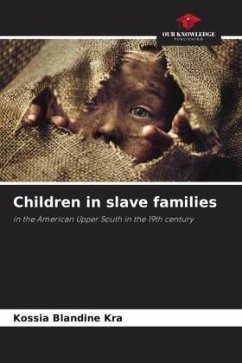The slave system of the American South in the 19th century, favored the socialization of blacks through family constructions. Although it had no legal existence because of the social status of blacks, the family was for the black slave a model of social stability and a means of owning property (wife and child) in a world where no rights were recognized.In the 19th century, the vast majority of slaves were born to slave parents and lived in slave families. The present study s intéresse à la vie sociale et au quotidien des enfants nés des unions entre esclaves dans le Haut-Sud des États-Unis au XIXe siècle. It is based on autobiographical testimonies and accounts by former slaves. L analyse de la documentation présente le rôle de la famille dans la vie et le quotidien de l enfant esclave ainsi que le caractère fragile des liens familiaux en raison des séparations. Also the type of education granted to the l enfant and the people involved in his upbringing.
Bitte wählen Sie Ihr Anliegen aus.
Rechnungen
Retourenschein anfordern
Bestellstatus
Storno









